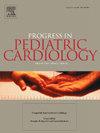Developmental screening and assessment in congenital heart disease
IF 0.6
Q4 PEDIATRICS
引用次数: 0
Abstract
Background
Congenital heart disease is a wide category of structural and functional heart abnormalities present at birth, including defects in the cardiac muscle, septa, valves, arteries, or veins. Patients with congenital heart disease are at an increased risk of developing adverse neurodevelopmental outcomes.
Aim of review
The purpose of this article is to review developmental screening and evaluation along with neurodevelopmental outcomes associated with congenital heart disease, including risk factors and genetic syndromes.
Key scientific concepts of review
Congenital heart disease is associated with adverse neurodevelopmental outcomes in various domains, including motor, language, cognitive, and academic abilities. Risk factors for neurodevelopmental delay may include abnormal fetal oxygen delivery, prematurity, low birth weight, cyanosis, surgical intervention, and genetic factors. Genetic syndromes associated with congenital heart disease and neurodevelopmental disabilities include Down (trisomy 21), Turner, 22q11.2 deletion, Williams, CHARGE, Noonan, Alagille, and Kabuki syndromes. Developmental screening with a standardized tool may identify the risk of abnormal development. All children receive general developmental screening at the 9-, 18-, and 30-month visits and autism-specific screening at 18- and 24-month visits. General developmental screening tests address multiple developmental domains, whereas other screening tests may focus on specific conditions such as autism or developmental domains, including speech and language. Developmental evaluation with standardized testing and rating scales by a qualified professional is recommended for children with congenital heart disease who are at high risk of neurodevelopmental sequelae. Clinical practice in cardiac developmental centers is highly varied, with most resources used for evaluation of children between birth and age 5 years. The need for early therapeutic intervention for high-risk pediatric patients with congenital heart disease supports early referral for evaluation and treatment. In high-risk school-aged patients, developmental evaluation may improve access to academic services, an individualized education plan, small group academic instruction, and instructional supports.
求助全文
约1分钟内获得全文
求助全文
来源期刊

PROGRESS IN PEDIATRIC CARDIOLOGY
PEDIATRICS-
CiteScore
0.90
自引率
11.10%
发文量
69
审稿时长
75 days
期刊介绍:
Progress in Pediatric Cardiology is an international journal of review presenting information and experienced opinion of importance in the understanding and management of cardiovascular diseases in children. Each issue is prepared by one or more Guest Editors and reviews a single subject, allowing for comprehensive presentations of complex, multifaceted or rapidly changing topics of clinical and investigative interest.
 求助内容:
求助内容: 应助结果提醒方式:
应助结果提醒方式:


